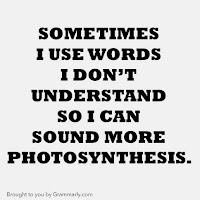So, reviews count on in as much as people read them and can be influenced by them. They are, much as with fiction, only as good as the writer in question. A bad review that says nothing doesn't help much, unless there is an overwhelming level of enthusiasm.
That said, I have no time for a proper review of reviews this week Deadlines!
So here's a slightly older article on the importance of emotions in fiction.
Have a great week!
So, let’s see: You’ve listened to me
rant on about reviews, characters, pacing, setting, dialogue, body language, the
time it takes a story to come out from idea to publication and the lack of
legitimate rules to follow. What’s next?
How about emotion? Not just the
emotions of the characters, but also the emotions of the readers and the
writers as well. Let’s be honest here, there isn’t a damned thing you can do
about the state of mind of a reader who picks up your work, at least not on the
surface.
When it comes to getting an emotional
response from a reader, however, you better be able to get something or your
story is screwed beyond all hopes of repair. Everything that I’ve rambled on
about here, and that the other writers at Storyteller’s Unplugged have
discussed, comes from experience. Right or wrong doesn’t even come into it.
There is no right or wrong when it comes to writing. There’s just observation
and experience. And the same simple fact is true when it comes to the process
of putting the words down on paper and convincing people to read them.
But believe me, from my own
experience, if you can’t get a person to empathize with the characters in your
story, that person is not going to become a fan of your stuff.
Emotions are what make us who we are,
and what differentiates us from the buildings nearby—well, okay, ONE of the
things that separates us from the buildings.
What the hell does any of this have
to do with writing? Well, if your characters are going to properly portray the
illusion of life, they will need to actually display emotional depth. More
importantly, they will have to react differently to situations. If every member
of a military outfit could do as well as Uncle Sam wanted them to, the average
war movie would be a great advertisement for joining the Armed Forces, but the
movie itself would suck eggs. What fun is a good shoot ‘em up if an occasional
soldier doesn’t freak out when he gets a Dear John letter from Betty Sue back
in Montana? If Lou over there doesn’t spaz a few times when the bombs are
falling, how can Sergeant Joe interact with him and remind him to be a man? Not
the best examples, maybe, but I suspect you’re getting my point.
Only a handful of writers can make a
story interesting when there isn’t emotional depth, and frankly, most of those
particular scribes passed away back at the end of the Pulp Era. (Conan doesn’t
cry, he just kicks ass, but he’s still fun.)
I’m not saying that every character
needs to become a drama queen (or king, let’s not be sexist), I’m saying that
even the ones who don’t like to let their emotions show still need to have
them. Even if the sole emotion the bag guys feels is a constant state of pissed
off, the writer has to reveal that in one way or another, or the person reading
the story will get bored.
There’s a balance in this as in all
things. Like most of the subjects I’ve discussed, emotions can be overdone very
easily. Mention the words “Vampire novel” to a lot of people and they roll
their eyes, sick to death of the “angsty” vampires. I tend to think that in most cases, monsters should be
allowed to be monsters, but that’s just me. It doesn’t take too big a push to
slide from sensitive he-man action hero to whiny little snot nosed brat.
Having said that, however, I will
again repeat myself (because to me it bears repeating) and point out that a
hero with out emotional flaws is most likely going to come across as have, at
best, two dimensions.
Wait, did I say flaws? Yes I did.
Nobody is perfect. Not only should the people you’re trying to create have
emotions, they should probably have a few flaws. I don’t mean like kryptonite
to Superman, I mean like occasionally getting upset about traffic. It’s just
damned hard for most people to root for a good guy who never makes mistakes and
never has issues to deal with. What the hell, I’ll keep with the superhero
thing for a minute. Bruce Wayne is financially successful, good looking, and
could just about pick and choose from the eligible ladies in Gotham City.
Instead, he dresses up like a bat and goes around beating the criminal element
into submission. Not only is this his driving ambition in life, it is also his
number one flaw. The man is obsessed. His parents were murdered I front of him
and he took it personally. The end result is Batman. Believe me, any good
shrink would put his butt on some serious medications and ship him off to a
special school for anger management. But it’s that obsession that makes him
interesting.
Victor Frankenstein spent a little
too much time dealing with death on a daily basis and became obsessed with life
and the artificial creation of it. Something inside his head went ping and the
next thing you know, he’s working on building a better human being. His flaw is
what makes him extraordinary.
Every hero, every villain, every bit
character in a novel should have emotions and flaws. Without them, they have as
much depth as the four hundred extras in a Bruce Lee movie.
So what sort of emotional flaws can
be used to your advantage? All of them. Hatred is a powerful motivator. So are greed, love, paranoia,
lust, longing, happiness, envy, depression…You get the idea. All of them are
important in adding depth to a character. All of them are just plain important.
That doesn’t mean you have to examine them to the point where they interfere
with the flow of the story, but they should at least be mentioned in passing.
On a more localized level, I’ll point
to a few books where the emotions of the characters made all of the difference
in the world. Cujo by Stephen King would have just been a book about a dog with
rabies if he hadn’t breathed emotional life into the characters. The son had a
serious issue with the monster in his closet. The mother and father were
dealing with a marriage that was falling to pieces and marital infidelity. The
father was also dealing with a little problem at work that was bordering on
costing him his entire career. Then, while you’re trying to handle the issues
of a family that’s already splitting at the seams, along comes a 185 pound
rabid dog to add to the stress. Without King’s exceedingly skillful hand
painting in the added dimensions of the characters, the book would have been
boring. Dear Lord, without the agony of the family falling apart, who would
have cared about the little boy dying by inches in the summer heat while Cujo
kept mother and child trapped a broken down car? How much of the story would have been different if James
Stewart didn’t have a fear of heights in Hitchcock’s Vertigo?
Once, long and ago, I co-wrote a
novel with another fledgling writer. It was a learning experience and one of
the first things I learned was that he and I would likely never write together
again. The main reason for that was simply because, despite his truly beautiful
prose, he couldn’t quite grasp a few of the intricacies of the human psyche. In
one scene that he wrote a secondary character was raped. First, I didn’t see it
as important to the story, but I could let that slide. But in the next scene,
said character was just as happy and cheerful as could be and actually passing
witty banter about the incident. Now, I don’t have any personal experience
along those lines, but I’m betting those unfortunate enough to go through such
trauma wouldn’t be wisecracking about it fifteen minutes later. My co-author’s
response when I brought this up was “Well, I don’t figure it’s the first time
it’s ever happened to her.” What? So the second time it’s just par for the
course? I don’t think so. There were arguments and rewrites galore. Forget as a
writer; as a reader, I simply couldn’t buy that scenario. For me the scene
would have completely ruined the experience as a reader and I would have
probably put the book down and never bothered with it again.
Just for kicks, here’s an exercise
for fledgling writers: think of a scenario with mild trauma—a mugging,
witnessing a crime, a fender bender—and then try to decide how five different
people will react to it. If you want to take it to the next logical level, you
can write down all five scenes and then wait a week or so and read them. See
what similarities there are and what differences. What should shine through, if
you’re doing your part as well as you’d like to, is how radically the scene is
changed by the emotions and reactions of the characters. IF they all read the
same except for the name and physical description, it’s time to seriously
reassess your techniques.
In the horror field especially, we
deal with traumas and phobias. If the characters react unemotionally (With
exceptions, granted) or improperly, we’re not going to keep readers coming back
for more.
In the fields of horror/science
fiction/fantasy or just plain speculative fiction, writers are asking people to
often take monumental leaps away from the norm. That’s all good and well, and a
decent number of people are willing to take the trip with the writers, but only
if the writers can help them along by making the characters at least a little
believable. A little human. That first step is a doozy, and without the help of
a little emotional empathy, it’s a step that can completely alienate the reader
and anyone the reader discusses the book with.





























